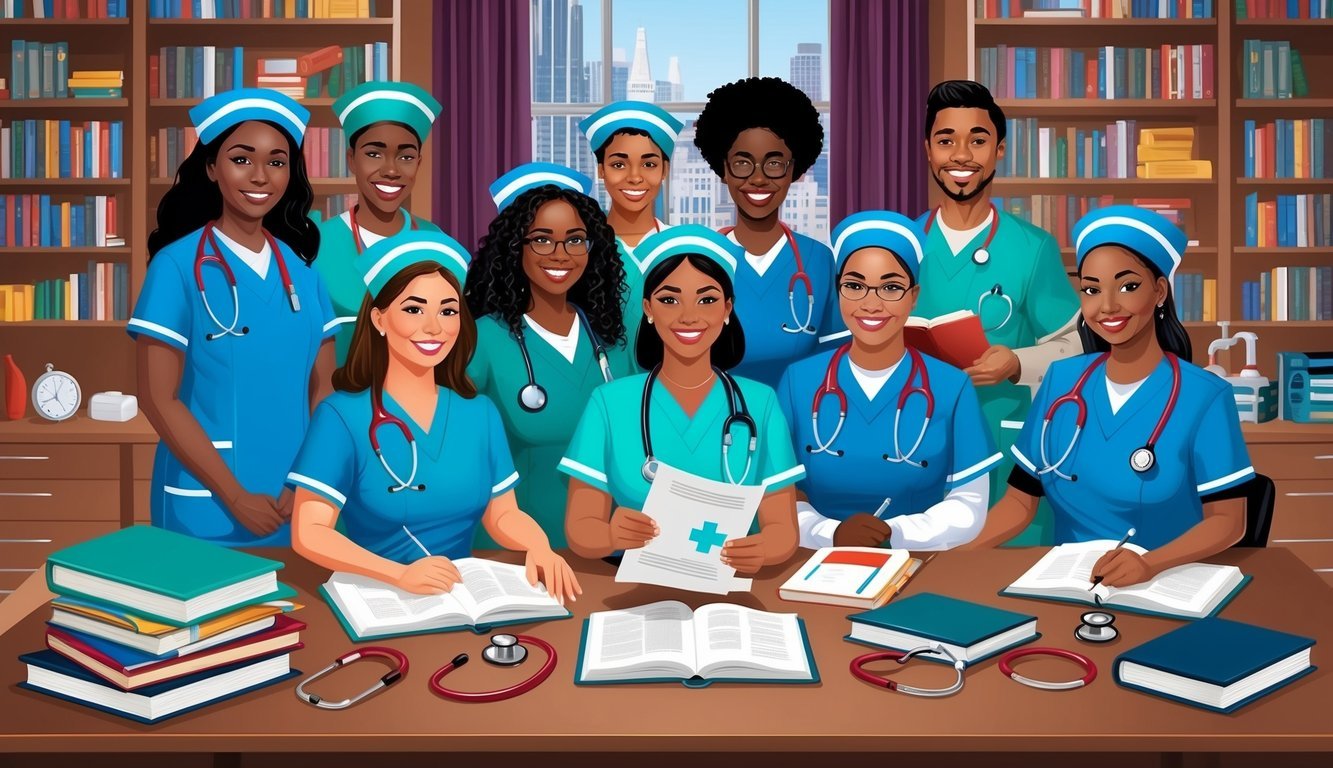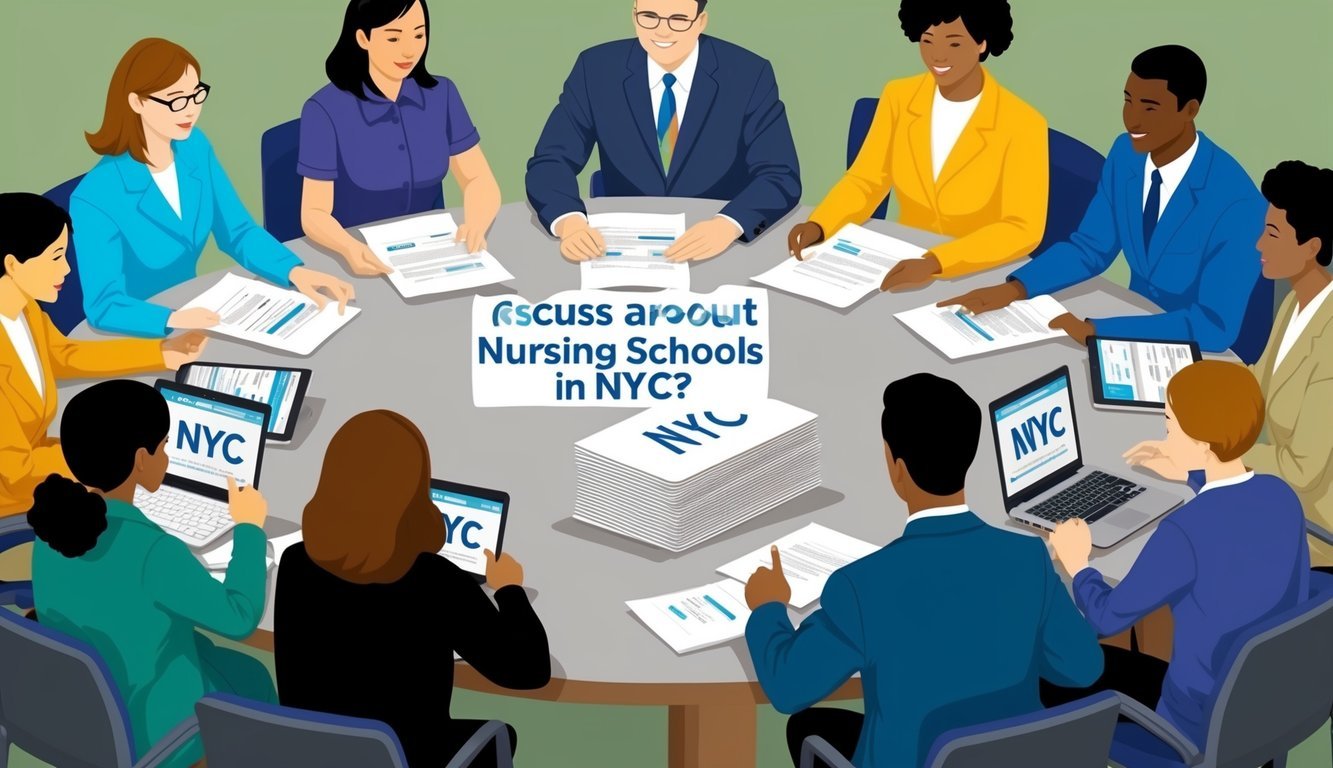Nursing schools in New York City offer diverse programs and have a strong emphasis on clinical education.
If you’re considering a career in nursing, NYC offers some of the best educational opportunities available.
You can find options for both undergraduate and graduate degrees.
These programs not only prepare you for the challenges of nursing but also connect you with a range of resources that support your career journey.
Many institutions in the city focus on fostering a diverse and inclusive environment, which aligns with the growing demand for culturally competent healthcare.
As you explore your options, keep in mind the various funding opportunities and scholarships available to nursing students.
The experience you gain in NYC’s dynamic healthcare settings can be invaluable in your development as a registered nurse.
The mix of research and clinical education found in these programs ensures that you receive a well-rounded education.
With the right information, you can confidently choose a nursing school that best fits your goals and aspirations.
Key Takeaways
- NYC offers diverse nursing programs for all education levels.
- Funding options can help ease the financial load for nursing students.
- Clinical experience in NYC enriches your nursing education.
Overview of Nursing Schools in NYC
New York City offers a variety of excellent nursing programs across its renowned institutions.
These schools provide the education and skills needed to succeed in the nursing field.
They feature strong curricula, experienced faculty, and clinical opportunities.
Columbia University School of Nursing
Columbia University School of Nursing is highly regarded for its rigorous programs.
The school offers graduate degrees, including Master of Science programs and Doctor of Nursing Practice.
It emphasizes research and evidence-based practice, preparing you to tackle modern healthcare challenges.
- Location: 630 West 168th Street, New York, NY 10032
- Programs Offered: Accelerated BS, Master’s, DNP
- Special Features: Opportunities for research and community engagement
The faculty comprises experienced professionals who guide you through both theoretical and practical aspects.
The school also has partnerships with leading hospitals for clinical experience.
Hunter-Bellevue School of Nursing
Hunter-Bellevue School of Nursing, part of the City University of New York, provides comprehensive nursing programs with a focus on urban health issues.
This school offers bachelor’s, master’s, and doctoral programs.
- Location: 425 East 25th Street, New York, NY 10010
- Programs Offered: BSN, MSN, DNP
- Special Features: Strong community partnerships, diverse clinical placements
You will benefit from a diverse learning environment and experienced faculty.
The school emphasizes serving vulnerable populations, making it a great choice if you’re interested in community health.
City University of New York Nursing Programs
The City University of New York (CUNY) offers a range of nursing programs across its multiple campuses.
With affordable tuition and a commitment to public health, CUNY prepares you for various nursing roles.
- Locations: Multiple campuses throughout NYC
- Programs Offered: Associate degrees, BSNs, MSNs
- Special Features: Focus on accessibility and community service
CUNY programs are designed for flexibility, allowing you to balance education with work or family.
The diverse student body enriches your academic experience, giving you exposure to various perspectives in healthcare.
Undergraduate Nursing Programs

Undergraduate nursing programs in New York City offer a structured path to become a registered nurse.
You will encounter essential aspects like the baccalaureate degree, the nursing curriculum, and the prerequisite courses necessary for entry.
Baccalaureate Degree in Nursing
A Baccalaureate Degree in Nursing (BSN) is widely recognized in the healthcare field.
Many programs in NYC, such as those at Hunter College and NYU Rory Meyers College of Nursing, prepare you to take the National Council Licensure Examination (NCLEX).
The BSN typically takes four years to complete.
This degree combines liberal arts and science courses with nursing education.
Hospitals and healthcare facilities often prefer candidates with a BSN for various positions, making this degree vital for your career.
Nursing Curriculum
The nursing curriculum in undergraduate programs is designed to provide a comprehensive education.
Core subjects often include:
- Nursing Fundamentals: Basic nursing skills and patient care.
- Pharmacology: Understanding medications and their effects.
- Health Assessment: Techniques for evaluating patient health.
- Nursing Research: Learning to use evidence-based practices.
You will also engage in clinical rotations across various settings, gaining practical experience.
These hands-on opportunities are crucial for applying theoretical knowledge in real-world scenarios.
Prerequisite Courses
Before starting your nursing program, you will need to complete specific prerequisite courses.
Common prerequisites may include:
- Biology: Understanding body systems and functions.
- Chemistry: Basics of chemical interactions in the body.
- Psychology: Insights into patient behaviors and mental health.
- Statistics: Essential for analyzing healthcare data.
Meeting these requirements ensures you have a solid foundation for nursing education.
Check with your desired program for the exact prerequisites needed for admission.
For details about undergraduate nursing programs, you can refer to resources like NursingProcess.org.
Graduate Nursing Education
Graduate nursing education in New York City offers advanced training tailored for those seeking to elevate their careers.
Programs are available for nurses pursuing master’s degrees as well as specialized training in fields like nurse anesthesia.
Master’s in Nursing Programs
A Master’s in Nursing can open up many opportunities.
Programs like those at CUNY School of Professional Studies and Hunter College focus on preparing nurses for roles as nurse educators or advanced practice nurses.
Key Details:
- Program Length: Typically 2-3 years
- Credit Hours: Usually around 30-43 credits
- Focus Areas: Education, leadership, and clinical practice
Graduates often find positions in hospitals, academia, or health policy organizations.
Doctor of Nursing Practice Program
The Doctor of Nursing Practice (DNP) is designed for nurses aiming for the highest level of clinical expertise.
Programs in NYC emphasize evidence-based practice and leadership.
Program Highlights:
- Duration: 3-4 years, part-time options available
- Curriculum: Focuses on advanced practice, patient care strategies, and organizational leadership
You will enhance your skills in clinical decision-making and contribute to healthcare innovations.
Nurse Anesthesia Program
Nurse anesthesia programs prepare advanced practice nurses to provide anesthesia care across various clinical environments.
Programs, such as those offered by Columbia School of Nursing, stress both academic coursework and hands-on experience.
Program Elements:
- Length: Generally 3 years
- Clinical Experience: Includes over 600 hours in diverse settings
- Certification Preparation: Prepares graduates for the National Certification Exam
In this role, you will ensure patient safety and manage anesthesia care throughout surgical procedures.
Research and Clinical Education

In nursing schools in NYC, research and clinical education play crucial roles in shaping skilled healthcare professionals.
You will engage in simulation-based learning and hands-on clinical rotations, both essential for mastering nursing practices.
Understanding these components will prepare you for a successful career in nursing.
Helene Fuld Health Trust Simulation Center
The Helene Fuld Health Trust Simulation Center is a state-of-the-art facility designed for nursing education.
This center offers realistic clinical scenarios using high-fidelity simulators that mimic real-life patient interactions.
Key features include:
- Interactive Learning: You engage with simulated patients, allowing you to practice assessments and interventions.
- Feedback Mechanisms: Real-time feedback from instructors enhances your learning experience.
- Team-Based Care: You often work in groups, fostering collaboration skills essential for healthcare settings.
This center bridges the gap between theory and practice, giving you confidence in your clinical abilities.
Clinical Rotations
Clinical rotations are a vital part of your nursing education, providing hands-on experience in various healthcare settings.
These rotations typically include:
- Medical-Surgical Nursing
- Pediatrics
- Psychiatric-Mental Health
- Community Health
During these rotations, you will work under the supervision of experienced nurses.
This helps you apply classroom knowledge to real-world situations.
It also allows you to observe different specialties, which can inform your career choices.
Each rotation lasts several weeks, giving you the opportunity to develop your skills and build professional relationships.
Nursing Research
Nursing research at schools in NYC is focused on improving patient care and healthcare practices.
Engaging in research helps you understand clinical questions and evidence-based practices.
You can participate in:
- Research Projects: Collaborate with faculty on projects that address current healthcare issues.
- Conferences: Attend events showcasing the latest nursing research and innovations.
- Publications: You may have the opportunity to co-author articles for nursing journals, enhancing your resume.
Participating in nursing research not only deepens your knowledge but also contributes to advancements in healthcare.
Diversity and Advocacy in Nursing
Diversity and advocacy are crucial in nursing education and practice.
They involve a commitment to health equity, social justice, and catering to the needs of diverse populations.
These aspects ensure that all patients receive quality care tailored to their unique backgrounds.
Health Equity and Social Justice
Health equity refers to providing everyone with fair access to healthcare services.
This means that nurses must understand the barriers that different populations face.
Social justice emphasizes equal rights and opportunities, especially in healthcare delivery.
Nursing schools focus on teaching future nurses about these concepts.
They encourage you to advocate for policies that promote equitable healthcare access.
You can explore frameworks and toolkits, like the New York State Diversity and Inclusion in Nursing Tool Kit, which aim to eliminate disparities in health care.
Diverse Populations
In NYC, nursing schools educate you about the diverse cultural and ethnic backgrounds of patients.
Understanding these differences is essential for effective communication and care.
Research shows that diverse nursing teams can improve patient outcomes.
To prepare for working with diverse populations, nursing programs emphasize cultural competence.
This includes learning about different beliefs, practices, and health literacy levels.
The AACN’s diversity resources provide data and strategies for incorporating diversity in nursing education.
Patient-Centered Care
Patient-centered care focuses on tailoring healthcare to meet individual patient needs.
This approach enhances patient satisfaction and encourages better health outcomes.
It requires nurses to consider patients’ preferences, values, and cultural backgrounds.
Nursing education in NYC emphasizes this model.
You’ll learn to engage with patients and involve them in decision-making about their care.
Schools often teach you how to advocate for patients who may struggle to express their needs.
This advocacy is vital to achieving health equity and promoting overall wellness.
Funding and Scholarships for Nursing Students

Finding funding for your nursing education can significantly ease your financial burden.
Various scholarships and programs are available to support your journey.
Here are some options:
| Scholarship Name | Details |
|---|---|
| Nurses For Our Future Scholarship | Covers tuition for 1,000 healthcare workers to earn an ADN or BSN in New York. Learn more. |
| Lucretia H. Richter Nursing Scholarship | Offers $1,000 per year to nursing students in Rochester who have completed one semester of clinical study. Find out more. |
| HRSA Nursing Scholarship Program | Provides tuition, fees, and a monthly stipend to nursing students in exchange for service commitments. Read details. |
In addition to scholarships, you should explore funding from federal and state aid programs.
The New York State Education Department offers valuable information on loans and grants.
You might also consider options for palliative care and sub-specialty programs.
These can lead to additional scholarship opportunities, so research organizations that focus on palliative care for potential funding sources.
By leveraging these resources, you can secure the financial support needed to pursue your nursing degree efficiently.
Frequently Asked Questions

In this section, you will find answers to common questions about nursing programs in New York City.
This includes details about accredited programs, duration, affordability, and options for online study.
What are the accredited nursing programs in New York City?
New York City offers several accredited nursing programs.
Notable institutions include Columbia University, NYU, and Hunter College.
Each of these schools provides various nursing degrees, such as BSN, MSN, and DNP.
How long is the duration of a typical nursing program in NYC?
Typically, a Bachelor of Science in Nursing (BSN) program takes four years to complete.
An Associate Degree in Nursing (ADN) usually requires two years.
Some accelerated programs can be completed in a shorter timeframe, often in 12 to 18 months.
Which institutions offer the best nursing programs for international students in New York?
Columbia University and NYU are well-known for their strong support for international students in nursing programs.
They offer various resources to help students adjust to academic life in the U.S.
What are the most affordable nursing education options in New York City?
For affordable nursing education, consider CUNY schools like Hunter College and BMCC.
These colleges often have lower tuition rates compared to private institutions while maintaining strong nursing programs.
Can I complete a nursing program online in New York City, and if so, which schools offer this?
Yes, many schools offer online nursing programs.
Institutions like NYU and Chamberlain University provide flexible online options for both RN-to-BSN and graduate-level nursing degrees.
Which CUNY college is recognized for its nursing curriculum?
Among CUNY colleges, Hunter College is recognized for its strong nursing curriculum.
It offers various undergraduate and graduate nursing programs, preparing students for diverse nursing careers.
For more information, visit Hunter College Nursing.

